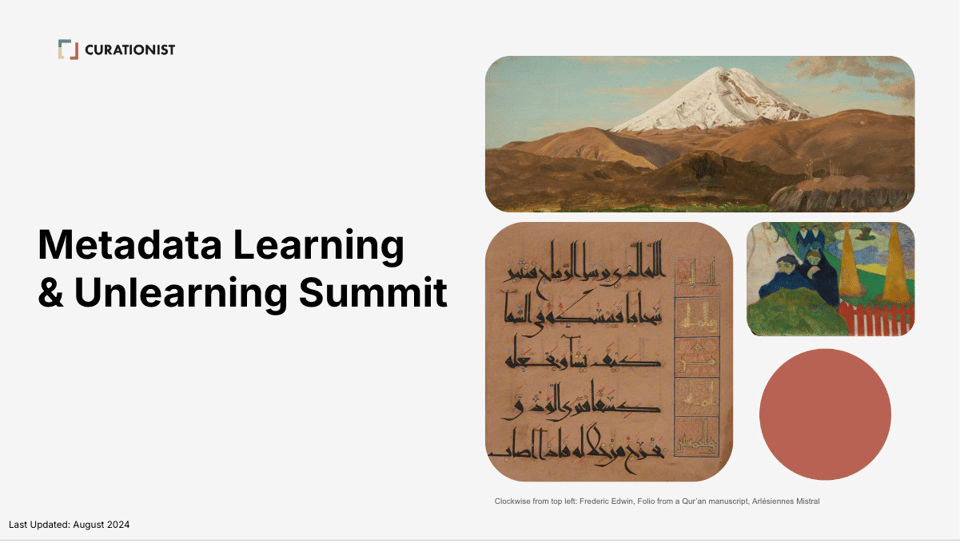ARTchivist's Notebook: To Wikidata or Not To Wikidata

For the past few months I’ve been working on a research project for Curationist, looking into two Wikidata-related questions: whether it makes sense to use Wikidata properties as a metadata schema, and whether Curationist should use Wikibase to store and manage their controlled vocabularies, which have come from Wikidata since its inception in 2021.
I’ll be presenting the preliminary outcomes of this research in front of a panel of Wiki experts at the Curationist Metadata Learning & Unlearning Summit, Thursday, September 19, from 11am - 12:30pm ET. I’ll be learning in public! If there’s one thing I’ve absorbed as an independent consultant, it’s how to get more comfortable — although I’m never fully at ease — with the potential for failure. Nothing ventured, nothing learned! And yet, I’m shaking in my boots a little bit to be presenting in front of these esteemed Wiki experts:
• Anni Saisto, Pori Museum
• Ben Vershbow, Wikimedia Foundation
• Christos Varvantakis, Wikimedia Deutschland
• Evelin Heidel, Curationist board member
• Hanno Lans, CopyClear
• Sandra Fauconnier, GLAM-Wiki Specialist
The session will provide a review of current Wikidata data models for cultural heritage materials, and a consideration of the pros and cons of integrating descriptive vocabularies and cataloging systems with Wikidata and/or Wikibase. If you’re curious about whether these technologies will work for your collections, the presentation will provide some useful perspectives and resources; if you’ve already integrated your systems with Wikidata (or decided against it), we would love to hear about your experiences!
A preview nugget: Despite the “fluidity” promised by linked open data (LOD), actually getting your metadata curated, properly formatted, deduped, and shared with Wikidata or Wikimedia Commons is a complex, multi-step process that can involve multiple tools and staff. A new term I learned (although I suspect many of you are already familiar with the concept) is “Upload Debt.” Because Wikidata and Wikimedia Commons are always changing, it’s easy to fall behind. One example that was new to me is when an institution changes their rights policies. If they previously uploaded a set of smaller image files to Wikimedia Commons with stricter rights but then decide to open up their access later, they must go through a complex deduping process to avoid having duplicates with conflicting copyright information. This is further complicated by crowd-sourced metadata that may have been added to the smaller images. Do you have a headache yet?
At any rate, if you come to the Summit, I promise it won’t be all horror stories! And it would be nice to see you.
Community Archives Research Published!
The results of my research into community-based archives and their access to online sharing with the UC Irvine Libraries CCAP TEACH project and the California Digital Library has been published! There are three reports and a guide for community organizations and their partners. I’ve been working on these for the past year or so and will dig into them more in a future newsletter.
Thanks for reading! If you have any comments or questions about this issue, please feel free to get in touch. Or follow me on LinkedIn.
ARTchivist's Notebook is an occasional newsletter musing on the intersection of archives, art, and social justice by me, Sharon Mizota, inclusive metadata consultant, researcher, and art writer.
I help museums, archives, libraries, and media organizations transform and share their metadata to achieve greater diversity, equity, and inclusion. Contact me to discuss your metadata project today.